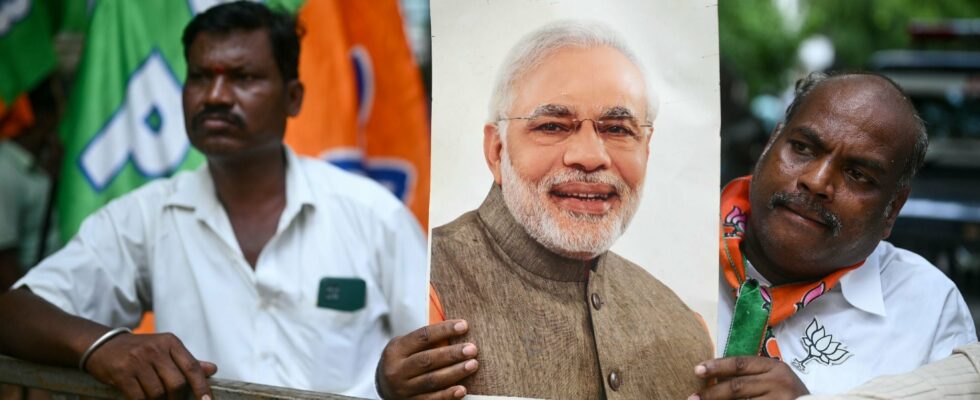Narendra Modi’s dream of transforming his country into a Hindu state is dashed. At the end of the legislative elections, the counting of which took place this Tuesday, the party of the nationalist leader, the BJP, lost the absolute majority obtained during the two previous elections, in 2014 and 2019. In a good position nevertheless to be probably reappointed at the head of the South Asian giant for a third five-year term, a feat that only the socialist Nehru had achieved before him, the far-right leader, 73, will have to rely on several small regional groups to govern. It hoped, with the latter, to obtain 400 seats out of 543, it would ultimately only obtain around 290, according to provisional data, or less than twenty seats more than the majority of 272. On its own, the BJP should have around 240 deputies in the hemicycle, compared to 303 previously. For the opposition, these figures demonstrate a “moral and political defeat”.
If the person concerned manages to save his head, he should focus as a priority, according to the Indian press, on strengthening India’s strategic autonomy in the coming months, with new investments in the manufacturing industry, heel Achilles of the Indian economy, defense in particular. A subject that he will raise on June 13 at the G7 summit, to which he was invited by the head of the Italian executive Giorgia Meloni, president of the far-right Fratelli d’Italia party, whom he considers a “friend “. There is no doubt that he will try to make people forget his very short electoral victory by now displaying the greatest seniority in power, in front of all the leaders of the club of great powers gathered in Fasano, in Puglia, including China, India and Italy. Russia is not part. In the eyes of Westerners, this divisive character paradoxically sees his chances of being seen as a relatable personality reinforced compared to the totalitarian leaders of the planet, India having just shown that its democratic mechanisms still functioned.
Attrition of power
In any case, it is a severe warning for anyone who has led an openly Islamophobic campaign. Narendra Modi had vowed to reach a two-thirds majority to be able to modify the Constitution, abandon the principle of secularism established by the fathers of independence in 1947, and ratify the supremacy of Hinduism to which 80% are attached. of the population (1.14 billion people), on Muslims (200 million) and Christians (35 million). Ultimately, the outgoing Prime Minister, taken by the sin of pride to the point of claiming to come from divine filiation, now seems affected by the weariness of power.
“The Modi bubble is deflating. He had made this election a personal matter but he is once again becoming a politician like any other,” said political scientist Pratap Bhanu Mehta. His hateful speech, delivered during more than two hundred meetings, sounded like a broken record. Without providing a response to the country’s concerns about record unemployment which affects half of young graduates, inflation which affects food products, the growing gaps between rich and poor, the despair of an over-indebted agriculture, the repeated attacks of the regime against freedom of expression and the independence of justice.
Narendra Modi undoubtedly suffered from an exceptionally long electoral process, six weeks which favored an increase in abstention. But he also suffered from the awakening of the opposition. The Congress party is making a spectacular comeback, having reached numerous withdrawal agreements with its coalition partners. The Gandhi family is thus able to form a bloc of 230 deputies (compared to 91 previously) around it. Without a designated candidate for the post of prime minister, she deprived Narendra Modi of a personified adversary and focused on defending a program with a very social tone. In doing so, she managed to overtake the BJP in traditional lands such as Uttar Pradesh and Maharashtra, the two most populous states in the Indian union.
There is no doubt that in the authorities of the ruling party, as in those of its parent company, the Association of National Volunteers (RSS), a nationalist organization within which the Modi apparatchik was formed, the time for regulations of accounts will ring. The outgoing head of government does not only have friends and the elephants who are in charge could very quickly lift a taboo, that of the post-Modi era. At the RSS headquarters in the city of Nagpur, the scion of a family of oil pressers from Gujarat has never really been in the odor of sanctity and some already see themselves taking his place.
